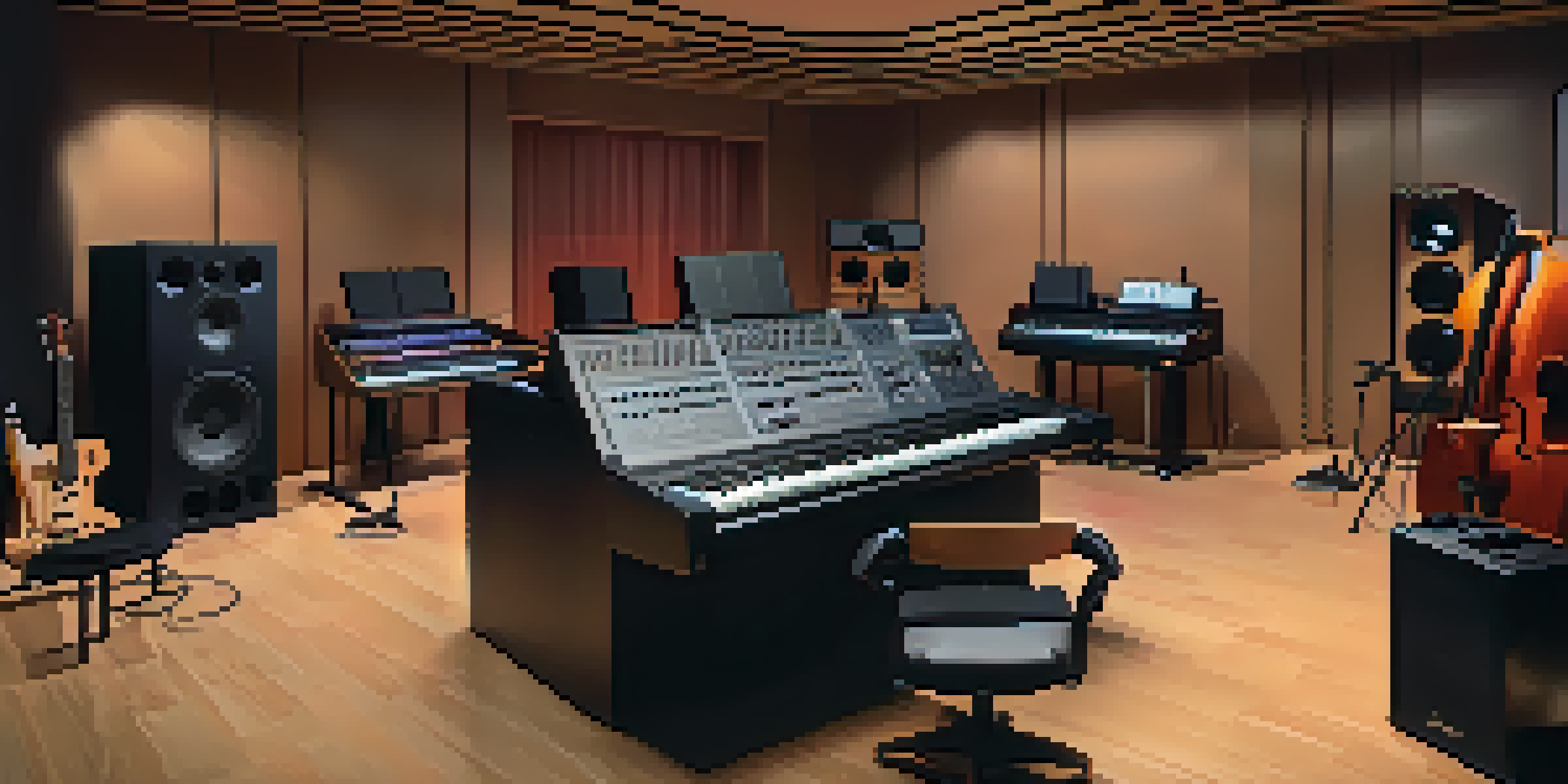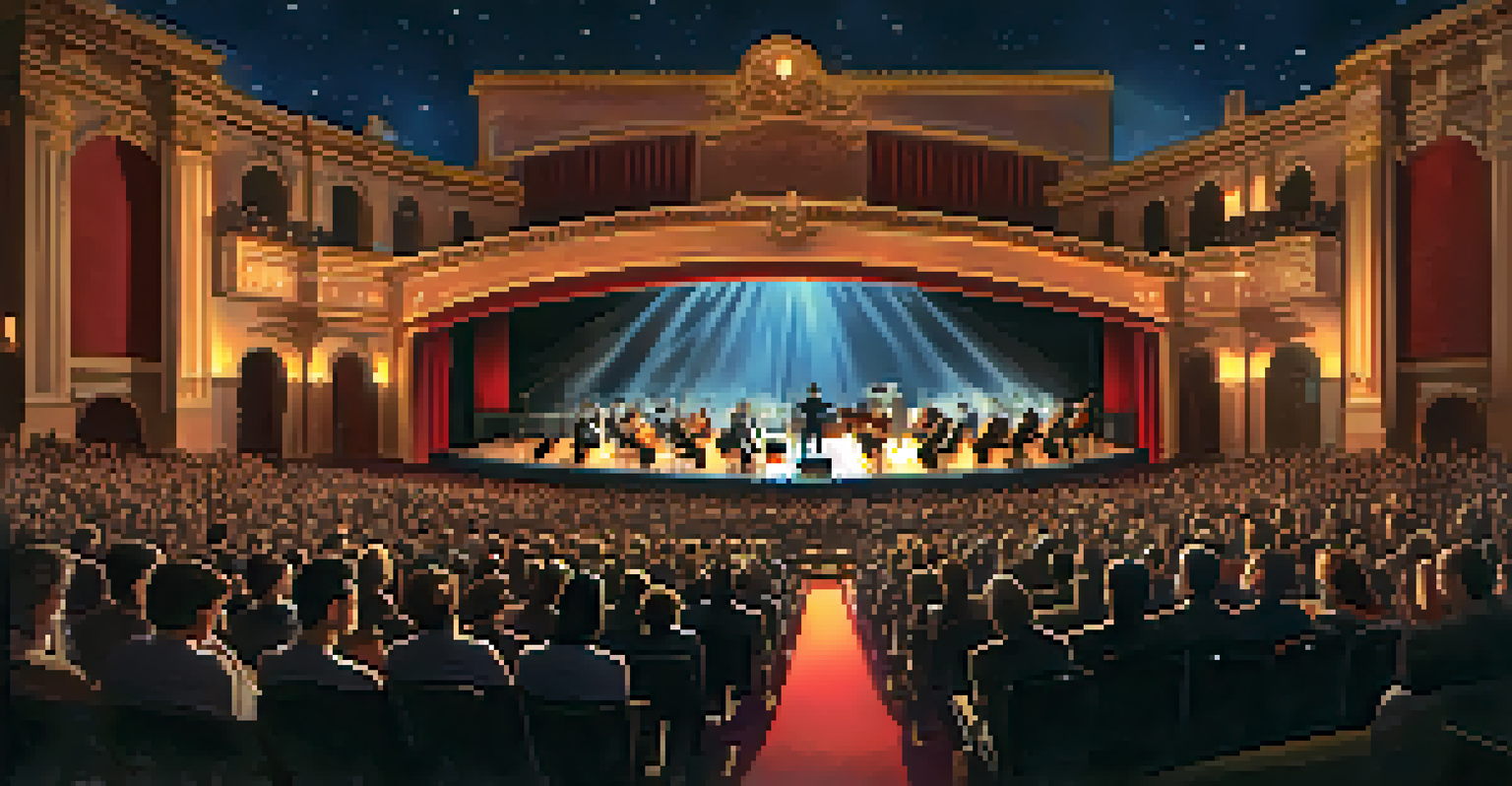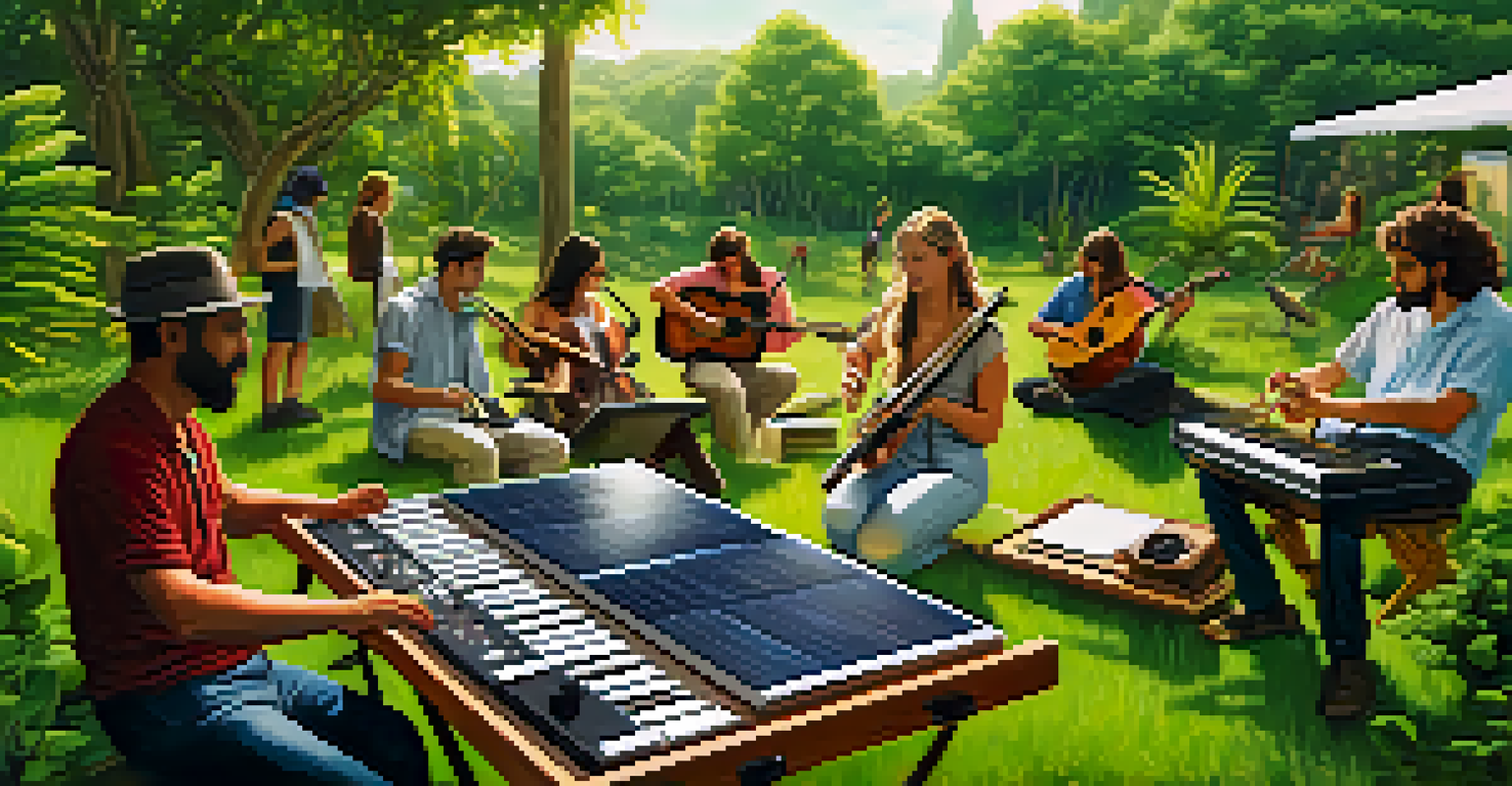The Future of Film Scoring: Trends to Watch in the Industry

The Rise of Adaptive Music in Film Scoring
Adaptive music, which changes based on viewer interaction, is gaining traction in film scoring. Imagine a movie that alters its soundtrack based on your emotional responses or decisions—this is becoming a reality. Composers are now experimenting with technology that allows scores to evolve in real-time, enhancing the viewing experience.
Music can change the world because it can change people.
This trend is particularly prevalent in video games, where music shifts according to gameplay dynamics. However, filmmakers are starting to recognize its potential in traditional cinema as well. This innovation not only makes films more immersive but also invites audiences to engage with the story on a deeper level.
As adaptive music technology continues to develop, it’s likely we’ll see a blending of genres and styles, creating unique soundscapes that are tailored to individual viewers. This could redefine how we experience storytelling, making every screening a unique journey.
The Impact of Artificial Intelligence on Composing
Artificial Intelligence (AI) is revolutionizing various industries, and film scoring is no exception. With AI tools capable of analyzing vast datasets of music, composers can leverage these technologies to enhance their creative processes. For instance, AI can generate suggestions for melodies or harmonies based on the style of a particular film genre.

While some may fear that AI could replace human composers, the truth is that it can serve as a valuable assistant. By automating repetitive tasks, AI allows composers to focus more on the emotional and creative aspects of their work. This partnership can lead to innovative soundtracks that blend human artistry with high-tech efficiency.
Adaptive Music Enhances Engagement
Adaptive music in film scoring evolves based on viewer interactions, creating a more immersive and personalized experience.
As AI continues to evolve, we can expect to see more collaborations between human composers and AI systems, resulting in scores that push the boundaries of traditional music. The future may hold a symbiotic relationship where technology and creativity coexist harmoniously.
The Growing Popularity of Hybrid Scores
Hybrid scores, which combine orchestral elements with electronic music, are becoming increasingly popular in film. This trend reflects a broader shift towards blending genres and creating unique auditory experiences. Think about how a lush orchestral piece can be seamlessly integrated with electronic beats, enhancing the emotional impact of a scene.
The music is the soundtrack of our lives; it tells the stories we live and the emotions we feel.
Composers like Hans Zimmer have mastered this art, using synths alongside traditional instruments to create soundscapes that resonate with modern audiences. This approach not only broadens the appeal of film scores but also allows for greater experimentation. As filmmakers seek to capture diverse audiences, hybrid scores provide the flexibility to do just that.
As we look to the future, expect to hear more hybrid scores that reflect the diverse tastes of global viewers. This trend may also inspire upcoming composers to explore new sounds, contributing to an ever-evolving musical landscape in film.
The Influence of Streaming Platforms on Film Music
Streaming platforms like Netflix and Amazon Prime are changing how film scores are created and distributed. With the rise of binge-watching, there's an increased demand for soundtracks that maintain viewer engagement across episodes. Composers are now faced with the challenge of crafting scores that not only fit a single film but can also evolve over a series.
This shift means that composers must think strategically about how music can enhance storytelling across multiple installments. The need for continuity while still keeping the audience's interest is crucial. As a result, many are creating motifs and themes that can be revisited and reinterpreted throughout a series.
AI Revolutionizes Film Composition
Artificial Intelligence is transforming film scoring by assisting composers in generating ideas and automating repetitive tasks.
As streaming services continue to dominate the film landscape, expect to see more tailored soundtracks that cater to binge-watching habits. This could lead to a new wave of scoring practices that prioritize long-form storytelling and audience retention.
The Role of Diversity in Film Scoring
Diversity in film scoring is not just a trend—it's becoming a necessity. As the film industry increasingly recognizes the importance of representation, the same applies to composers. By bringing in diverse voices, filmmakers can create scores that reflect a wider range of cultural experiences and narratives.
This shift encourages composers from various backgrounds to share their unique perspectives through music. It can also lead to collaborations that blend different musical traditions, resulting in rich, multifaceted soundtracks. A film score that incorporates elements from various cultures can enhance the storytelling and resonate more deeply with a global audience.
As we look ahead, the push for diversity in film scoring will likely shape the industry significantly. Expect to hear more innovative soundtracks that celebrate cultural richness and challenge conventional norms.
Embracing Environmental Sustainability in Scoring
As awareness of environmental issues grows, the film industry is exploring ways to become more sustainable, including in film scoring. Composers are starting to consider the ecological impact of their work, from the materials used in recordings to the energy consumption of production processes. This trend reflects a broader commitment to sustainability in all aspects of filmmaking.
For instance, some composers are opting for digital tools that reduce the need for physical resources, such as printed sheet music or physical instruments. Additionally, there is a movement towards recording in eco-friendly studios that utilize renewable energy sources. These practices not only minimize the carbon footprint but also set a positive example for future generations in the industry.
Diversity Shapes Film Soundtracks
Increased diversity among composers leads to richer, more culturally reflective film scores that resonate with global audiences.
As sustainability becomes a priority, we can expect to see more initiatives that promote environmentally friendly practices in film scoring. This shift will not only benefit the planet but also resonate with audiences who value eco-conscious storytelling.
The Evolution of Live Film Scoring Events
Live film scoring events are gaining popularity, offering audiences a unique way to experience films. These events feature musicians performing a film's score live, enhancing the emotional impact of the visuals. It's akin to watching a concert with a film playing in the background—an immersive experience that brings a new dimension to the art of film scoring.
This trend is not just for classic films; contemporary scores are also being showcased in live performances. Such events create a community atmosphere, allowing fans to connect with both the music and the film on a deeper level. The combination of live music and visual storytelling fosters a shared experience that transcends traditional cinema.

As more filmmakers and composers embrace this format, we can expect to see a rise in live scoring events around the world. This evolution may lead to greater appreciation for film scores and could inspire a new generation of composers to create music specifically for live performances.